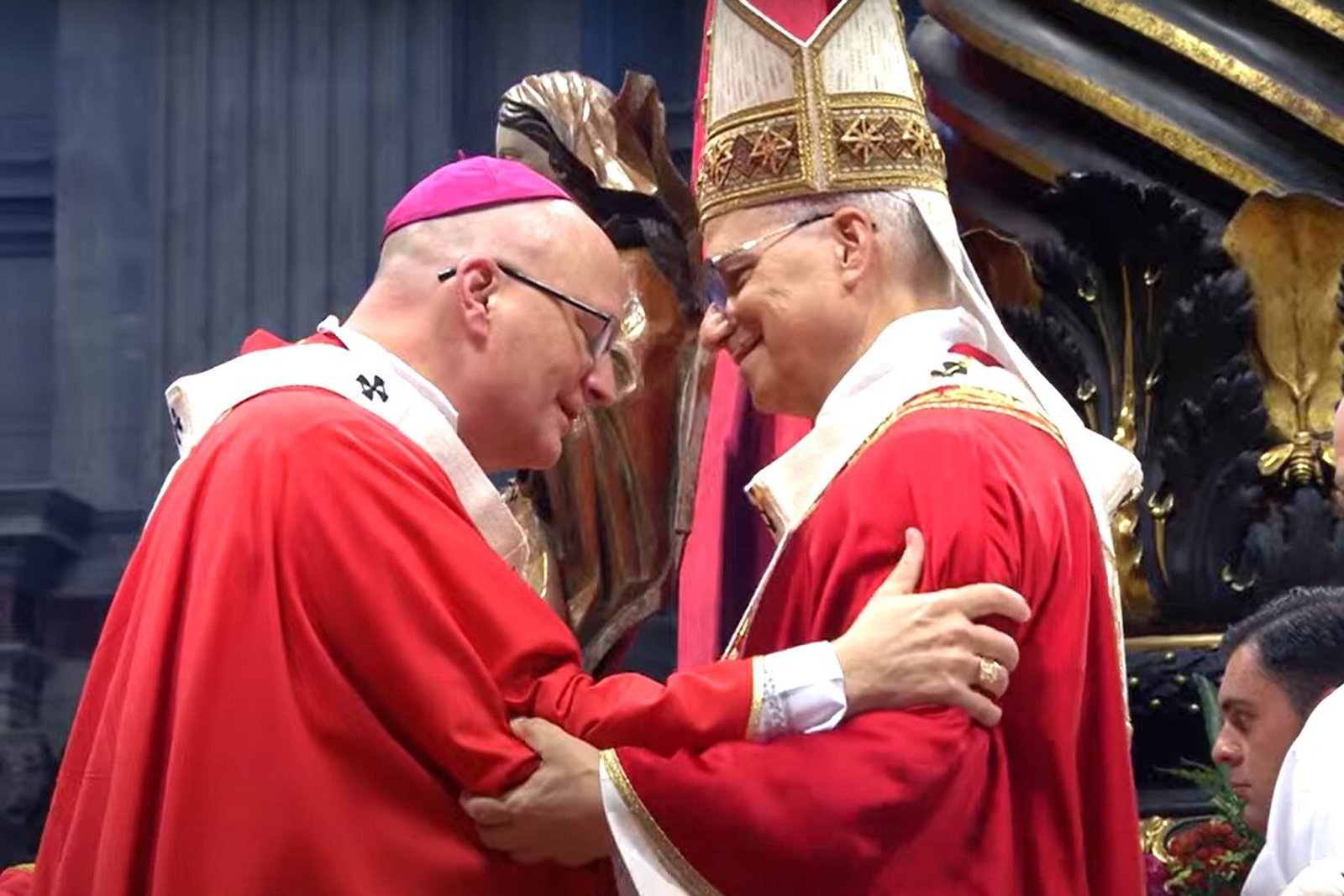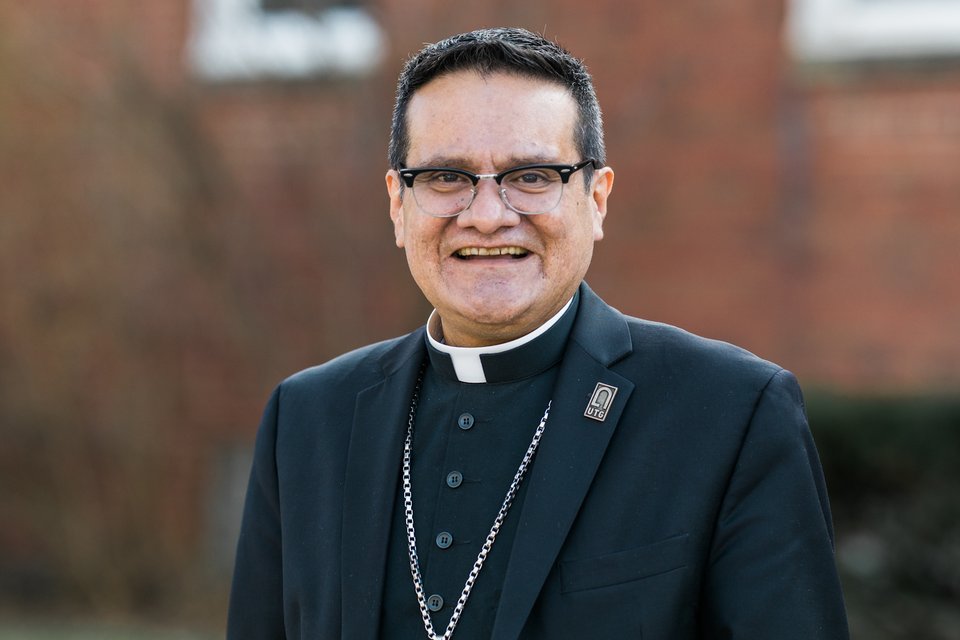While receiving his pallium, archbishop reminded pope of his diaconal ordination in Michigan, of which Leo has 'fond memories'
Archbishop Edward J. Weisenburger of Detroit spoke with Catholic News Service at the Pontifical North American College in Rome June 29, 2025, after receiving his pallium from Pope Leo XIV. Here is the full transcript of the interview with minor edits for clarity.
Catholic News Service: How was this day for you? You went up there to receive your pallium from Pope Leo, an American pope. What was this experience like?
Archbishop Weisenburger: It was a wonderful experience. When you go up, you have just a moment to greet him after he imposes the pallium on you. And you have a quick moment to say, "God bless you, thank you." And I did, I thanked him, and he gives everyone the sign of peace; it's part of the rite, actually.
And so after he embraced me, and he looked at me and I said, "You were ordained a deacon in Michigan." And before I could go any further, he said, "Yes! Yes, St. Clare's Parish. Yes, I have fond memories." I said, "Well, the people of Detroit, the Archdiocese of Detroit, throughout Michigan have great love and affection for you." And he smiled and he said, "I have great love and affection for them."
It was just a lovely moment there to be able to receive the pallium, this sign of unity with the Holy Father, as well as the role I have for the people of the archdiocese and the bishops within the province. To receive that from an American was a wonderful feeling. And I must also say, as much as it's wonderful that he's an American, it also moves me personally and deeply that he's a man who understands the work of the missions and evangelization. So when you put all that together, it was just a lovely day.

CNS: I didn't realize there was a Michigan connection. What sort of feedback have you been getting from people who knew him? What have you been hearing?
Archbishop Weisenburger: People who knew him are all delighted and they're all kind of reveling in the fact that they have a connection. Actually my predecessor in Tucson, who's a very dear friend of mine, Bishop (Gerald F.) Kicanas (who was born in Chicago), he worked quite a bit and knew Bishop and then-Cardinal Prevost quite well. And actually the Diocese of Tucson, where I was serving after Bishop Kicanas, has a priest working there from the Diocese of Chiclayo, (Peru).
So I'd spoken once, I think, on the phone with Cardinal Prevost, I think he was Bishop Prevost at that time. But Bishop Kicanas actually, I believe, has his cellphone number, and so texted him congratulations right after he was elected and later on he got a message back. But I'm running into a lot of people who, if they don't know him today, they knew him from the past and that's a great joy for the people in Michigan and beyond.
CNS: He has experience in the U.S., experience in Latin America, his missionary presence as well, having been with the Augustinians. What kind of message does that give to the Church for evangelization?
Archbishop Weisenburger: I think his missionary work has helped give him a vision and that vision of the Gospel much like Pope Francis had a vision of the Gospel. His vision of the Gospel, I think, is one to return to evangelization and being concerned about spreading the faith.
I love being an American. I'm proud to be an American; I'm not one of those Americans bashing, everything's wrong. No, there's a lot that's good in America. But I would say sometimes we tend to be a little self-referential. We look at our own situation, and I fear that in the last few decades, we've stopped reaching out the way our ancestors did with faith, and actually, and especially, even supporting the missionary work of the Church around the world.

We just had a bishops' meeting in San Diego and the Holy Father gave us a message there saying how dear the missions are to his heart and urging us to continue to encourage our people to support the missions, that the faith might continue to grow.
Many of those dioceses around the world, and I think over 100 seminaries, are all supported by the mission appeal that we do every year. So again, he's reminding us of our roots, taking us back to the heart of the Gospel, and reflecting it for us in a beautiful way.
CNS: Two of his main themes so far that he's expressed are peace and unity. How do you feel you can help (Pope Leo) in this mission?
Archbishop Weisenburger: I think there's different layers of those issues. And I think always, for every follower of Jesus Christ, for every true Christian, it begins with when we create peace and unity in our own lives, it becomes a lot easier for the world to become a more peaceful and unified place.
I would say even in our culture, we have people that hop from parish to parish, looking for the message they want to hear, the style of liturgy they want to experience. And historically, parishes were places where you bond together as a people, in a community, and you know each other, and you support each other, and you help each other. And when my faith is weak, I lean on you. When your faith is weak, you lean on me. And that sense of unity on the local level I think is suffering.
So I really think one of the ways we Americans and especially we in the Archdiocese of Detroit — I would begin with myself at home — we need to really look at how we're building those local communities, and that creates unity.
Then when you look at the disunity, not just in our world in America — and there is division and disunity and loud crying, shouting voices — but around the world, I think we need to walk into those situations and, a lot like the great saints of our Church, we become like a sponge that soaks in some of that anger, hostility, negativity, but don't give it back. We just let it die with us. And I think when we do that, we become a people of unity and peace, and then we can help make the world a more unified, peaceful place.
Copy Permalink
Bishops










